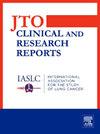Developing a Conceptual Framework for a Person-Centered Approach to Improving Adherence and Outcomes in Lung Cancer Screening: The Engaged Approach to Lung Cancer Screening: A Brief Report
IF 3
Q2 ONCOLOGY
引用次数: 0
Abstract
Introduction
Translating outcomes from randomized trials of lung cancer screening into community practice settings has been challenging. We developed a framework—the Engaged Approach to Lung Cancer Screening (EA-LCS)—for improving adherence and individual and population health outcomes in LCS.
Methods
Employing community-engaged research, we conducted semistructured interviews with LCS program staff (N = 15) and participants (N = 7) and administered brief surveys to understand LCS adherence. We combined our knowledge of LCS implementation with data to formulate the EA-LCS framework, including principles and strategies instrumental for LCS adherence.
Results
Program staff identified four factors that facilitated adherence: (1) the use of specialized tracking software, (2) the importance of personal connection and a reliable touchpoint, (3) centralized program operations, and (4) standardization and streamlining of reports to participants and clinicians. Participant data identified four factors supporting adherence: (1) a single contact point and information availability, (2) tailored communications, (3) personalized results delivery, and (4) increased scan accessibility. Combined analyses identified three overarching themes in the EA-LCS framework: (1) respect, (2) trust, and (3) engagement.
Conclusions
The EA-LCS conceptual model integrates three foundational principles (person-centeredness, trustworthy relationships, and sustained communications) to enhance LCS adherence. Efforts are underway to translate the EA-LCS framework into materials to support adherence.
为以人为本的方法制定概念框架,以改善肺癌筛查的依从性和结果:肺癌筛查的参与式方法》:简要报告
导言将肺癌筛查随机试验的结果转化到社区实践环境中具有挑战性。我们开发了一个框架--肺癌筛查参与式方法(EA-LCS)--用于改善肺癌筛查的依从性以及个人和人群的健康结果。方法我们采用社区参与式研究,对肺癌筛查项目的工作人员(15 人)和参与者(7 人)进行了半结构式访谈,并进行了简短的调查,以了解肺癌筛查的依从性。我们将对 LCS 实施情况的了解与数据相结合,制定了 EA-LCS 框架,其中包括对坚持 LCS 有益的原则和策略。结果项目工作人员发现了四个有助于坚持 LCS 的因素:(1)使用专门的跟踪软件;(2)个人联系和可靠接触点的重要性;(3)集中的项目运作;(4)向参与者和临床医生报告的标准化和简化。参与者数据确定了支持坚持使用的四个因素:(1) 单一接触点和信息可用性,(2) 量身定制的沟通,(3) 个性化的结果交付,以及 (4) 扫描可及性的提高。综合分析确定了 EA-LCS 框架的三个首要主题:(1) 尊重;(2) 信任;(3) 参与。结论 EA-LCS 概念模型整合了三个基本原则(以人为本、值得信赖的关系和持续沟通),以提高 LCS 的依从性。目前正在努力将 EA-LCS 框架转化为支持坚持治疗的材料。
本文章由计算机程序翻译,如有差异,请以英文原文为准。
求助全文
约1分钟内获得全文
求助全文
来源期刊

JTO Clinical and Research Reports
Medicine-Oncology
CiteScore
4.20
自引率
0.00%
发文量
145
审稿时长
19 weeks
 求助内容:
求助内容: 应助结果提醒方式:
应助结果提醒方式:


